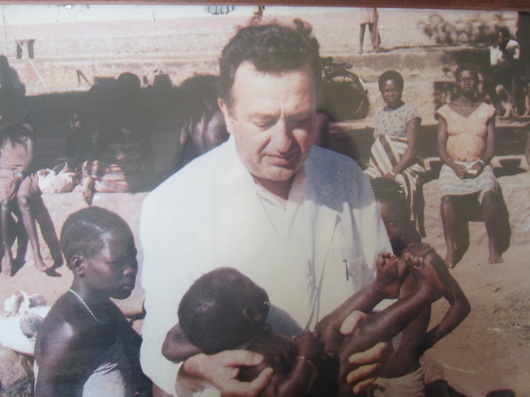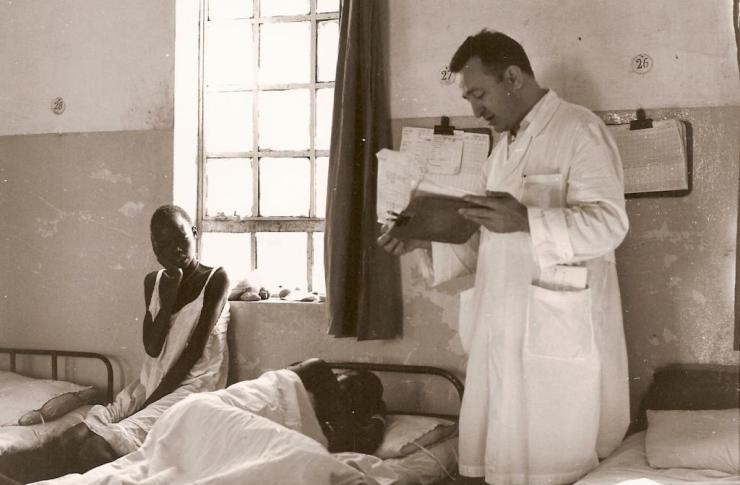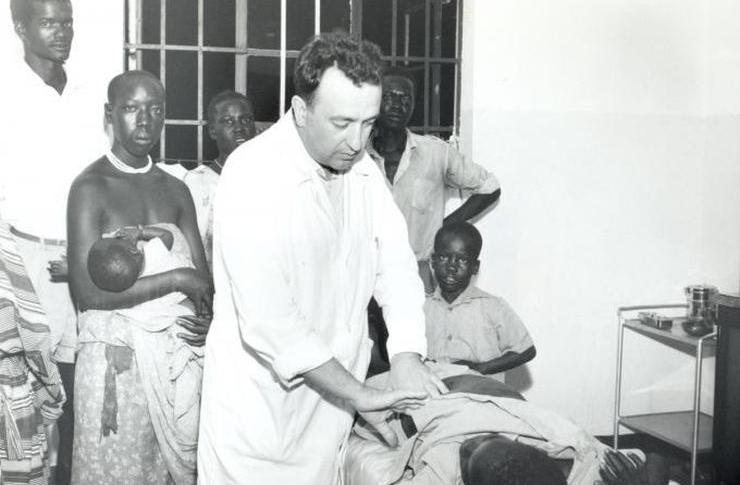Giuseppe Ambrosoli was born in Ronago in 1923 as the seventh son to Giovanni Battista Ambrosoli and Palmira Valli (d. 1977). His paternal great-grandfather worked as a librarian.
Ambrosoli studied first in Como and later under the Piarists in Genoa before returning to Como for his high school studies which he completed after his examinations in 1942. He joined the “Cenacle” which was a branch of the Azione Cattolica that the Franciscan Silvio Riva ran and Ambrosoli got the chance to get to know Riva who served as a spiritual guide for him and his religious formation.

He studied medicine at the Milanese college but had to stop his studies due to World War II. In September 1943 he risked his own life pledging to save a large number of Jewish people in order to get them safe passage across the border to Switzerland to prevent them from ending up in concentration camps.
He took care of them and he himself took refuge with them fearing he would be captured on the return home. He returned home to learn from his parents that he was required to join the armed forces and he did on 27 March 1944.
Ambrosoli was stationed at the Heuberg-Stetten training camp near Stuttgart and returned home in December 1944 for additional service. Ambrosoli served at Collecchio near Parma and later in Berceto where he became known for his closeness to the town’s poor.
He resumed his studies in November 1946 after the war’s end and graduated from the college in Milan as a Doctor of Medicine on 28 July 1949. He then proceeded to obtain a tropical medicine diploma from a college in London before returning to his homeland where he commenced his studies for the priesthood in Venegono.
He received his ordination as a priest in Milan at the cathedral on 17 December 1955 from the Archbishop of Milan Giovanni Battista Montini – the future Pope Paul VI.

Ambrosoli served as both a priest and doctor before he arrived in Uganda as a professed member of the Comboni Missionaries of the Heart of Jesus. He had begun his novitiate in Gozzano on 18 October 1951 and made his first profession in 1953.
On 1 February 1956 he was posted to Kalongo (in Northern Uganda) to serve as the parish priest and also to run a clinic that at that time was seeing a lot of leper cases. He learnt the Acholi language in order to better communicate with the locals.
In 1957 he began the transformation of the clinic into the Kalongo Hospital leading to expansion with 345 beds. He is credited with the transformation of care for lepers in admitting them to the same hospital as other patients instead of confining them to a leprosaria.
Those leprosaria were at the time managed poorly which led to patient neglect. In 1959 he established the “Saint Mary’s School of Midwivery with a view of handing over the care of the patients to local Ugandan staff at some stage in the future.
Ambrosoli loved the writings of Blessed Charles de Foucauld. He was convinced that a doctor was called to lend his work to the suffering of Jesus Christ in the face of the poor and vulnerable and often said that “I am His servant for people suffering”. He also often said that “God is love”. When blood transfusions were scarce he himself donated his own blood to those in need of it.
Ambrosoli died on 27 March 1987 at the Comboni Mission in Lira after he had been diagnosed with kidney disease. The cause of his death is stated as renal failure.
He celebrated his final Mass on 22 March at the Comboni College chapel and that afternoon felt feverish. He later asked for Father Marchetti to hear his confession and died at 1:50pm.
Cardinal Gianfranco Ravasi praised Ambrosoli for his “faith in Christ and of Christian love to which he had consecrated his entire existence”.

